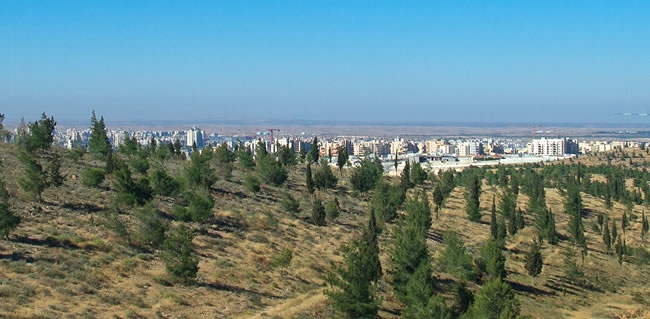Situated in the geographical middle zone of Israel, some 55 miles from Jerusalem and 62 miles from Tel Aviv, Beersheba, also known as Be'er Sheva is distinguished as the capital of the Negev. It is the region’s largest city with some 200,000 residents and the gateway to the southern part of Israel. While Beersheba is usually not on a normal Christian tour of Israel itinerary it is none the less an interesting area to learn about.
People first began to settle in Beersheba during the Chalcolithic period, when the first humans settlers established villages on the banks of the riverbed. The region was also inhabited during the biblical times, some 4,000 years ago; Beersheba was mentioned in the Bible 35 more than the city of Jerusalem. This, actually, is where monotheism began to thrive, on the edges border of the desert and the settled areas.
A noteworthy history of Beersheba is that it is the only city established by the Ottomans from their 400 year period of ruling the region. The Ottomans lost control of it in October 1917, which they lost to the ANZAC troops of the British Empire in the last cavalry battle ever fought.
Beersheba became part of the State of Israel, exactly 31 years later when the Negev brigade of the Palmach captured the town. Today Beersheba is the capital of the Negev and is the regions biggest city with more then 200,000 local residents. In addition to its interesting history and tourist attractions, Beersheba is an ideal location for exploring all types of sites in the Negev: the makhteshim and Har Hanegev areas; the Yattir and Lahav forests; the Dead Sea and Masada; Nahal Besor; the Arava; the Bedouin villages; and the western Negev. One can tour from the basic isolation of the center of desert to the comfort of a modem city within the span of a single day.
The Old City of Beersheba
History enthusiast will find much to hold their interest on an Israel tour of Beersheba, as well those with an interest in ethnic art and architecture. Here’s a sample tour of Beersheba available upon request:
Start the Israel day tour at the memorial to the Negev Brigade (sculpture designed by Dani Karavan), where there is a stunning panoramic view of the Beersheba Valley (the biblical Beersheba desert area). Karavan's sculpture is made up of many different parts that symbolize various aspects of the War of Independence. At its center is a memorial to the fallen soldiers in the war.
A short distance down the road is Tel Beersheva (entrance fee required), an administrative center in the days of the Judean kings. Here you’ll see some of the most impressive ancient water works uncovered in Israel as of today. After touring the center, continue to the Well of Abraham situated at the edge of the Old City.
From that point, travel down KKL Street into the Ottoman City to what is known as the 20 meter street because of its unusual width and similarity to a European boulevard. At the end of the street is the Saraya, the Ottoman administrative headquarters, which was later taken over by the British. Today it is a police station. Proceed to Allenby Park, where a statue of the British general is erected in the parks center. Ironically, the park is named after the general who defeated the Turks and was constructed by Turks. It was the first public park in the State of Israel. Directly across the park is the governor's house, which today is the Negev art museum. A mosque that appears similar to those found in Turkey is situated in the same compound. After on to Ha'atzmaut Street where you’ll find a beautiful building that was originally a school for the children of sheikhs, it recently was rehabilitated and will be used as a science education center.
Continue down the street. On the left is the British military cemetery in which the ANZAC troops who fell in the Battle of Beersheba are buried. Across the road, just past the modern apartment buildings, is the Turkish railway station, where the tour ends, except on Thursday. On Thursday, the Bedouin market opens near the Old City (it is a 20 minute walk or 5 minute drive from the Well of Abraham).
